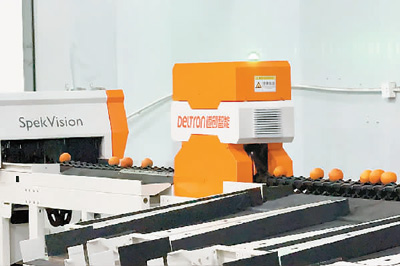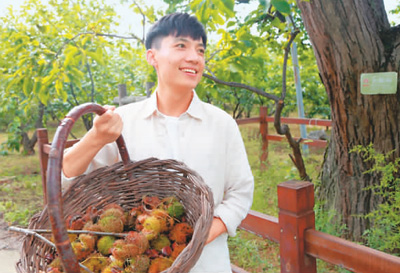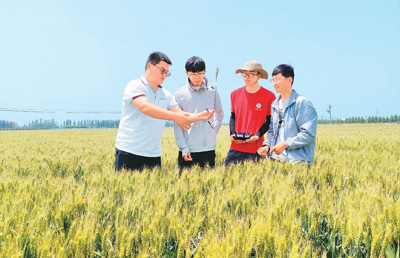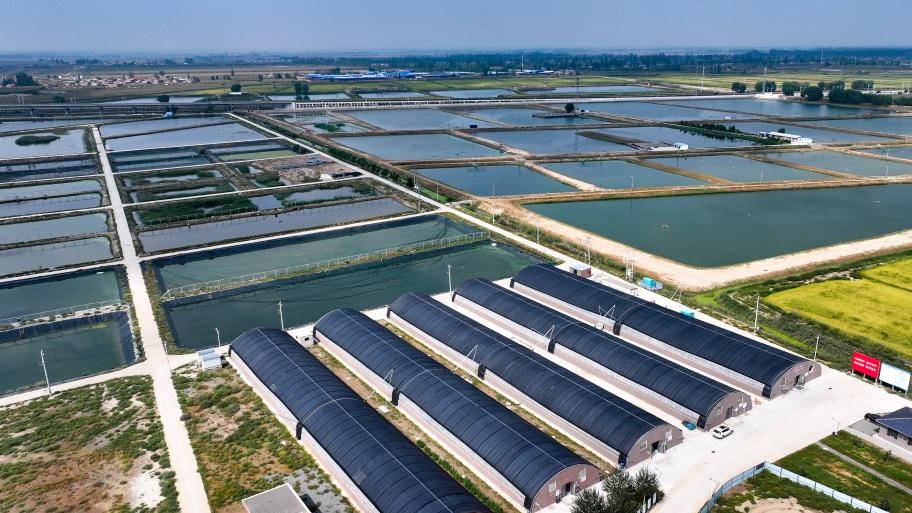China's tech-savvy 'new farmers' transform traditional farming
A new generation of farmers in China is embracing technology and innovation, breathing fresh life into the country's agricultural sector.
These "new farmers," including drone pilots, agricultural managers, and livestreamers, are bringing modern skills and ideas to traditional farming practices.
According to official statistics, China has cultivated over 9 million “new farmers” to date, providing crucial support for the development of agriculture and rural areas.
Tang Xinchen, a computer science graduate from Sichuan University, exemplifies this trend. The former product manager at an internet firm now heads a family farm in his hometown of Qionglai city, southwest China's Sichuan Province.

An AI-powered fruit sorting machine co-developed by Tang Xinchen, a "new farmer" in Qionglai city, southwest China's Sichuan Province, and an agricultural technology company. (Photo courtesy of the interviewee)
Born after 1995, Tang manages 200 mu (13.33 hectares) of orchards and 1,000 mu of rice fields. This year, he became a partner in a local agricultural machinery cooperative.
Tang's farm showcases the integration of traditional farming with modern technology. He has redesigned his orchards to accommodate autonomous vehicles for pesticide spraying and organic fertilizer application, significantly improving efficiency and reducing labor costs.
If an unmanned vehicle works 10 hours a day, it can complete plant protection work on a 200-mu farm in just two and a half days, according to Tang.
He has also implemented AI-powered fruit sorting machines, which were jointly developed with an agricultural technology company. These machines analyze each fruit's weight, appearance, and sugar content, ensuring efficient quality selection.
Last September, Tang launched his own fruit brand and shared his entrepreneurship experience on social media, garnering over 10 million views. In 2023, his online sales reached 3 million yuan ($423,000), while he helped fellow farmers broaden their market reach.
The rise of tech-savvy "new farmers" like Tang is transforming Chinese agriculture from a labor-intensive industry reliant on experience to a data-driven, mechanized sector.
In March 2024, the Ministry of Commerce and eight other government departments announced plans to nurture about 10,000 individuals to lead rural e-commerce initiatives over the next five years.
Many young people are already embracing the "new farmer" role. Li Sipeng, who manages a planting cooperative in Beijing's Huairou district, represents this trend, using livestreams to sell agricultural products.
Bohai township boasts a nearly thousand-year history of chestnut cultivation. However, the chestnut industry in Huairou district faced a growth bottleneck due to increased nationwide competition and limited sales channels.

Li Sipeng, a "new farmer," shows harvested chestnuts in an orchard in Bohai township, Huairou district, Beijing. (Photo courtesy of the interviewee)
Li, a native of the district with a degree in education, decided to join his father's chestnut planting cooperative in 2017 after witnessing the sector's struggles.
He organized professional training for local farmers, invested in chestnut processing equipment, and promoted product diversification through value-added chestnut processing.
Li expanded the sales channels for chestnuts by partnering with established brands such as Beijing's time-honored snack brand Daoxiangcun. He led his team to open online stores on e-commerce platforms like Taobao and JD.com and leveraged channels, including livestreams and the short-video sharing platform Douyin, to further increase the cooperative's brand influence.
Li's efforts have boosted the chestnut industry and attracted young people back to their hometown. Now, Li's new team members, most of whom were born in the 1990s, are injecting fresh vitality into the chestnut industry with innovative marketing methods.
To support "new farmers" in playing a larger role in comprehensive rural revitalization, both central and local governments have rolled out a series of policies to build up the ranks of these modern agriculturists.
For example, Hangzhou city in east China's Zhejiang Province launched an action plan in April 2024 to cultivate over 100,000 "new farmers" by 2027, focusing on talents in areas such as agricultural technology, production and operation, and rural e-commerce. Three months later, the second season of Zhejiang's program for cultivating rural livestreamers was held at Jingshan Academy in Hangzhou.

Rural livestreamers participate in a training session during the second season of Zhejiang's rural livestreamer cultivation program in Hangzhou city, east China's Zhejiang Province. (Photo courtesy of the interviewee)
The training program for rural livestreamers is meticulously crafted to equip participants with a comprehensive set of skills essential for successful livestreaming, according to Ye Xiaoqian, director of the training department at Jingshan Academy. Since September 2023, the training program has attracted more than 1,000 participants.
Universities are also playing a crucial role in nurturing "new farmers." China Agricultural University (CAU), for instance, established the country's first "Science and Technology Backyard" (STB) program in Quzhou county, north China's Hebei Province, in 2009. The program aims to cultivate high-level agricultural talents and serve the modernization of agriculture and rural areas.
"Over the past 15 years, the university has cultivated more than 700 postgraduate students through the STB program," said Li Xuedi, director of the STB management office at CAU. "About 80 percent of them have chosen careers in agriculture-related fields, and many have become 'new farmers.'"
Photos
Related Stories
- Farmers embrace apple harvest in NW China's Shaanxi
- Farmers busy harvesting, processing goji berries in NW China’s Ningxia
- Spring ploughing season begins in SW China
- Farmers across China busy with agricultural production on day of Rain Water
- Farmers harvest strawberries at greenhouse in Beijing
- China trains high-quality farmers for rural revitalization
Copyright © 2024 People's Daily Online. All Rights Reserved.









